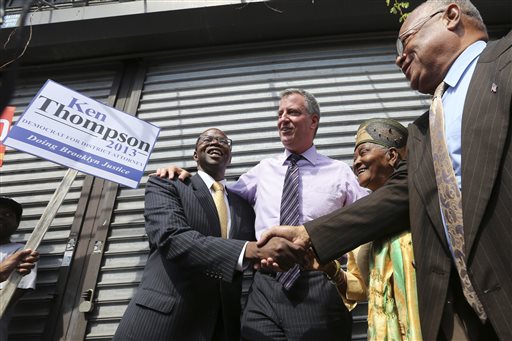Nov. 7, 2013 marked the 24th anniversary of the day that David Dinkins became the first African-American mayor of New York City. This year’s city elections, meanwhile, showed the continued influence of African-Americans in New York politics.
On Nov. 5, elections results included these winners: Public Advocate-elect Letitia James, Brooklyn Borough President-Elect Eric Adams, 35th District City Council-Elect Laurie Cumbo, and Brooklyn District Attorney-elect Ken Thompson. All of them are African-American Brooklyn residents. Bill de Blasio, Mayor-elect, who is married to an African-American woman, lives in Brooklyn.
And people noticed. Gwendolyn Brooks, 89, a longtime Prospect Heights resident, was happily surprised oat the 2013 African-American results. “I remember when his sort of thing would never happen for someone of color. African-Americans were thought of as labor,” Brooks said. And, she added, “All of them are from Brooklyn, which has always taken a backseat to Harlem in producing leaders. But now we are the new renaissance.”
Vivian White, another Prospect Heights resident, thinks “renaissance” is too strong a word. But, “Ever since the Barclays Center was built,” White said. “there has been a renewal in Brooklyn communities.”
When New York City African-American politicians win elections they tend to nod to Shirley Chisholm as the pioneer of African-American politics. She was the first woman to be elected to Congress and later became the first black person—and first black woman—to run for president on a major party ticket (Democrat). She won the 12th District Seat in Brooklyn and helped open the doors for other African-Americans in politics.
“Shirley Chisholm started it all, and it would be remiss to not bring up her name any time a person of color wins an election in this city,” Brooklyn resident James Thomas said. “She gave the idea for blacks to think about holding a government position other than janitor or maid.”
In 2011, Roscoe C. Brown Jr., a City University of New York professor, hosted CUNY’s show “African American Legends” and interviewed former mayor David Dinkins about the impact Shirley Chisholm had on African-American politics. “We knew she would not have won, but the fact that she was respected among the candidates of a major party was the goal,” Dinkins said. “Today’s African-American politicians owe her courage to their success.”
The United States Census Bureau estimates that Brooklyn is 35.8% Black or African-American. This number is slowly decreasing as many Brooklyn neighborhoods are gentrifying. Still, many of 2013 New York City election victories were based upon the African-American vote.
“Obama showed the world how powerful the black vote is,” Brooks said. “The same thing can be said in New York.” And, she added, “This city’s diversity helps people make more decisions other than race.”


Leave a Reply